Human Factors and Work Performance in Health Care
VerifiedAdded on 2023/06/03
|13
|3303
|428
AI Summary
This paper explores the impact of human factors on work performance and how they relate to quality and safety in healthcare provision. It focuses on the relationship between healthcare professionals and how this relationship can impact the service delivery and patient outcomes. It’s also focused on human factors related to patient safety rather than the safety of health care workers. The paper discusses organizational management, teamwork, and fatigue and their effect on work performance and quality and safe healthcare delivery.
Contribute Materials
Your contribution can guide someone’s learning journey. Share your
documents today.
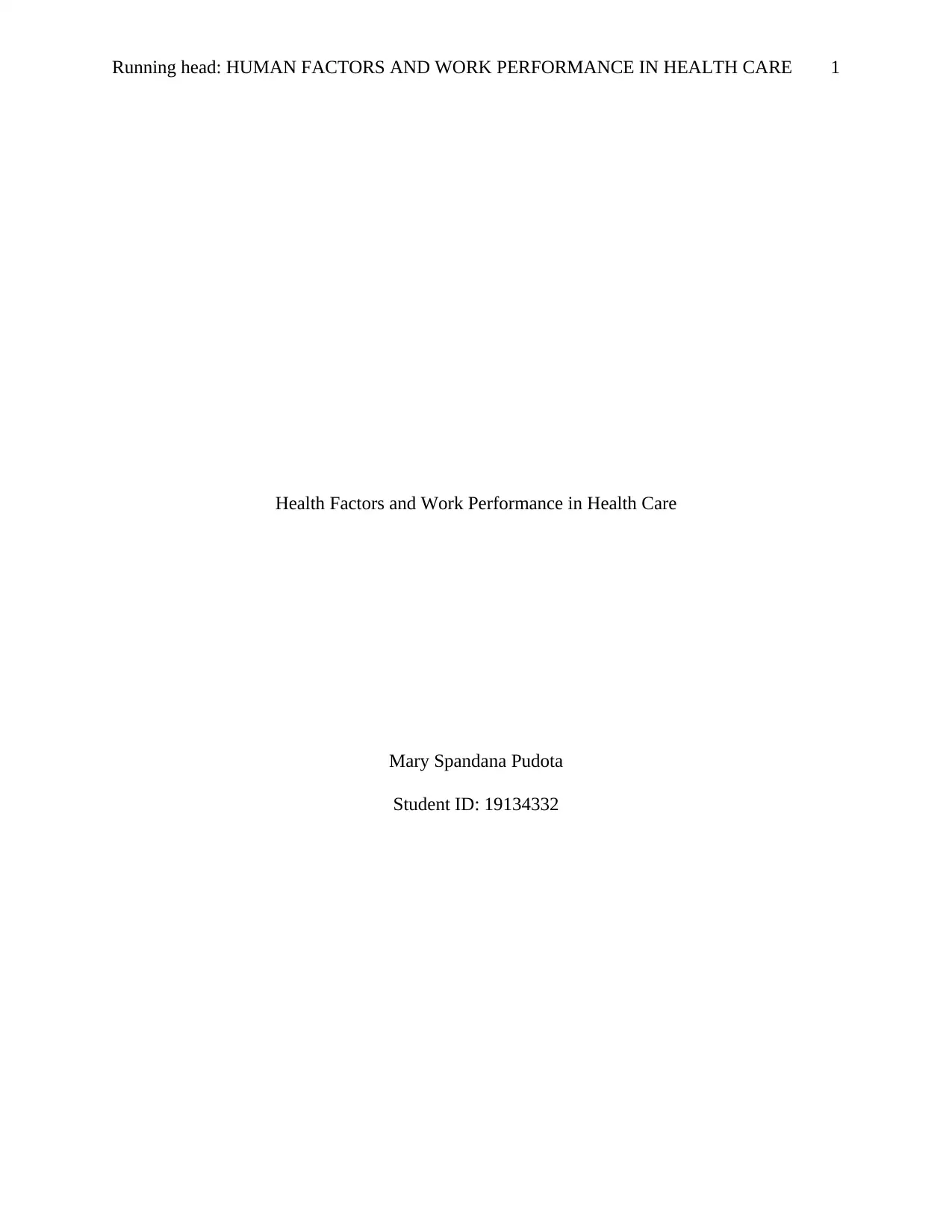
Running head: HUMAN FACTORS AND WORK PERFORMANCE IN HEALTH CARE 1
Health Factors and Work Performance in Health Care
Mary Spandana Pudota
Student ID: 19134332
Health Factors and Work Performance in Health Care
Mary Spandana Pudota
Student ID: 19134332
Secure Best Marks with AI Grader
Need help grading? Try our AI Grader for instant feedback on your assignments.
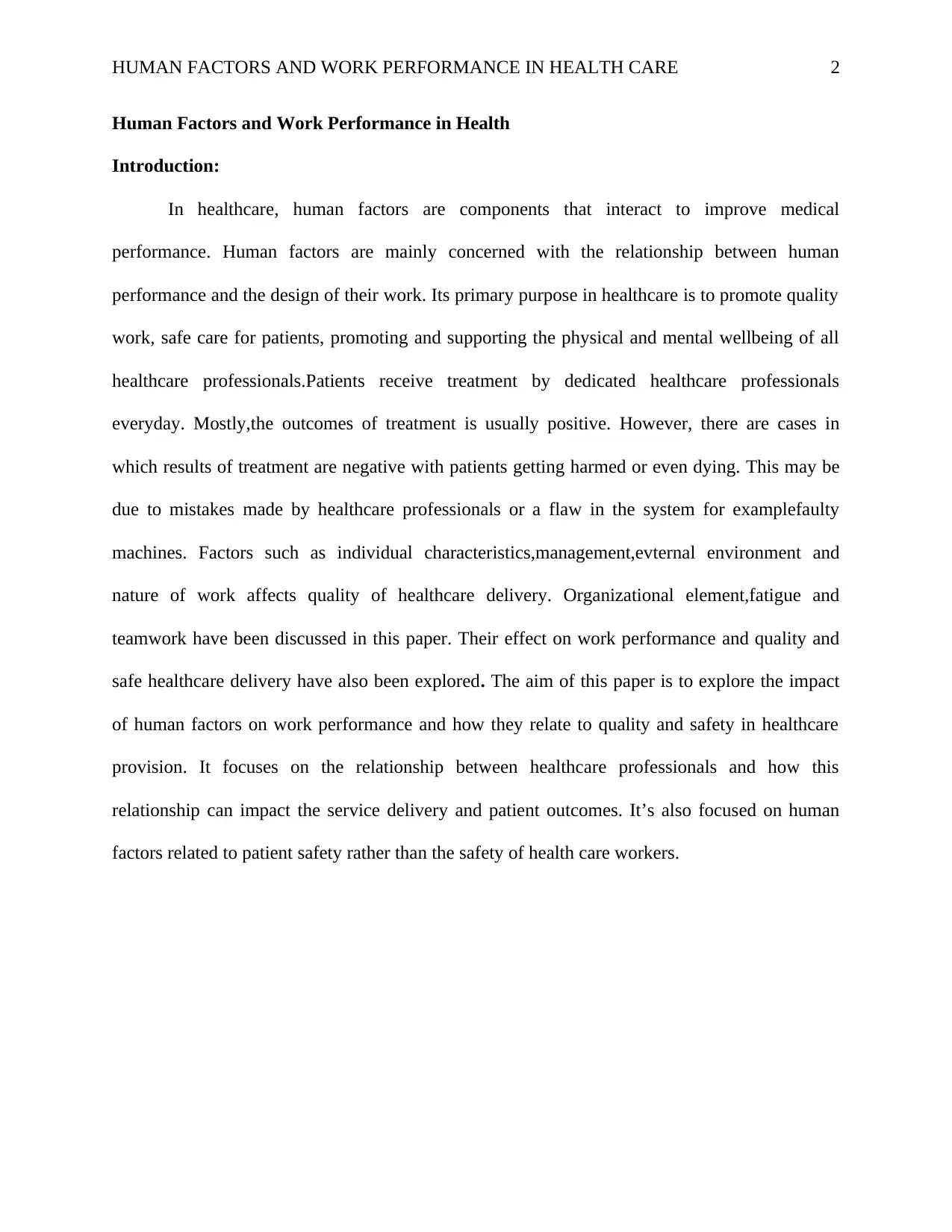
HUMAN FACTORS AND WORK PERFORMANCE IN HEALTH CARE 2
Human Factors and Work Performance in Health
Introduction:
In healthcare, human factors are components that interact to improve medical
performance. Human factors are mainly concerned with the relationship between human
performance and the design of their work. Its primary purpose in healthcare is to promote quality
work, safe care for patients, promoting and supporting the physical and mental wellbeing of all
healthcare professionals.Patients receive treatment by dedicated healthcare professionals
everyday. Mostly,the outcomes of treatment is usually positive. However, there are cases in
which results of treatment are negative with patients getting harmed or even dying. This may be
due to mistakes made by healthcare professionals or a flaw in the system for examplefaulty
machines. Factors such as individual characteristics,management,evternal environment and
nature of work affects quality of healthcare delivery. Organizational element,fatigue and
teamwork have been discussed in this paper. Their effect on work performance and quality and
safe healthcare delivery have also been explored. The aim of this paper is to explore the impact
of human factors on work performance and how they relate to quality and safety in healthcare
provision. It focuses on the relationship between healthcare professionals and how this
relationship can impact the service delivery and patient outcomes. It’s also focused on human
factors related to patient safety rather than the safety of health care workers.
Human Factors and Work Performance in Health
Introduction:
In healthcare, human factors are components that interact to improve medical
performance. Human factors are mainly concerned with the relationship between human
performance and the design of their work. Its primary purpose in healthcare is to promote quality
work, safe care for patients, promoting and supporting the physical and mental wellbeing of all
healthcare professionals.Patients receive treatment by dedicated healthcare professionals
everyday. Mostly,the outcomes of treatment is usually positive. However, there are cases in
which results of treatment are negative with patients getting harmed or even dying. This may be
due to mistakes made by healthcare professionals or a flaw in the system for examplefaulty
machines. Factors such as individual characteristics,management,evternal environment and
nature of work affects quality of healthcare delivery. Organizational element,fatigue and
teamwork have been discussed in this paper. Their effect on work performance and quality and
safe healthcare delivery have also been explored. The aim of this paper is to explore the impact
of human factors on work performance and how they relate to quality and safety in healthcare
provision. It focuses on the relationship between healthcare professionals and how this
relationship can impact the service delivery and patient outcomes. It’s also focused on human
factors related to patient safety rather than the safety of health care workers.
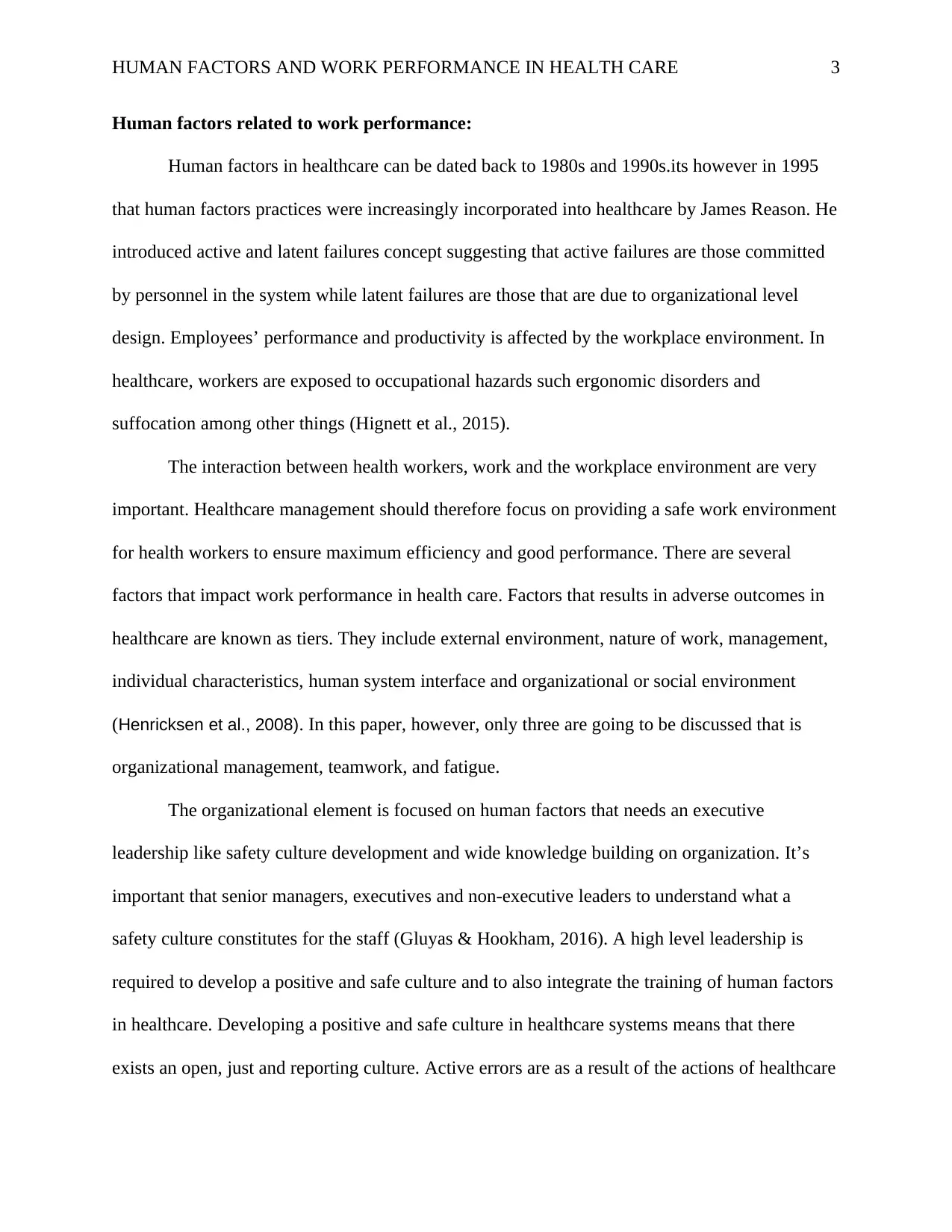
HUMAN FACTORS AND WORK PERFORMANCE IN HEALTH CARE 3
Human factors related to work performance:
Human factors in healthcare can be dated back to 1980s and 1990s.its however in 1995
that human factors practices were increasingly incorporated into healthcare by James Reason. He
introduced active and latent failures concept suggesting that active failures are those committed
by personnel in the system while latent failures are those that are due to organizational level
design. Employees’ performance and productivity is affected by the workplace environment. In
healthcare, workers are exposed to occupational hazards such ergonomic disorders and
suffocation among other things (Hignett et al., 2015).
The interaction between health workers, work and the workplace environment are very
important. Healthcare management should therefore focus on providing a safe work environment
for health workers to ensure maximum efficiency and good performance. There are several
factors that impact work performance in health care. Factors that results in adverse outcomes in
healthcare are known as tiers. They include external environment, nature of work, management,
individual characteristics, human system interface and organizational or social environment
(Henricksen et al., 2008). In this paper, however, only three are going to be discussed that is
organizational management, teamwork, and fatigue.
The organizational element is focused on human factors that needs an executive
leadership like safety culture development and wide knowledge building on organization. It’s
important that senior managers, executives and non-executive leaders to understand what a
safety culture constitutes for the staff (Gluyas & Hookham, 2016). A high level leadership is
required to develop a positive and safe culture and to also integrate the training of human factors
in healthcare. Developing a positive and safe culture in healthcare systems means that there
exists an open, just and reporting culture. Active errors are as a result of the actions of healthcare
Human factors related to work performance:
Human factors in healthcare can be dated back to 1980s and 1990s.its however in 1995
that human factors practices were increasingly incorporated into healthcare by James Reason. He
introduced active and latent failures concept suggesting that active failures are those committed
by personnel in the system while latent failures are those that are due to organizational level
design. Employees’ performance and productivity is affected by the workplace environment. In
healthcare, workers are exposed to occupational hazards such ergonomic disorders and
suffocation among other things (Hignett et al., 2015).
The interaction between health workers, work and the workplace environment are very
important. Healthcare management should therefore focus on providing a safe work environment
for health workers to ensure maximum efficiency and good performance. There are several
factors that impact work performance in health care. Factors that results in adverse outcomes in
healthcare are known as tiers. They include external environment, nature of work, management,
individual characteristics, human system interface and organizational or social environment
(Henricksen et al., 2008). In this paper, however, only three are going to be discussed that is
organizational management, teamwork, and fatigue.
The organizational element is focused on human factors that needs an executive
leadership like safety culture development and wide knowledge building on organization. It’s
important that senior managers, executives and non-executive leaders to understand what a
safety culture constitutes for the staff (Gluyas & Hookham, 2016). A high level leadership is
required to develop a positive and safe culture and to also integrate the training of human factors
in healthcare. Developing a positive and safe culture in healthcare systems means that there
exists an open, just and reporting culture. Active errors are as a result of the actions of healthcare
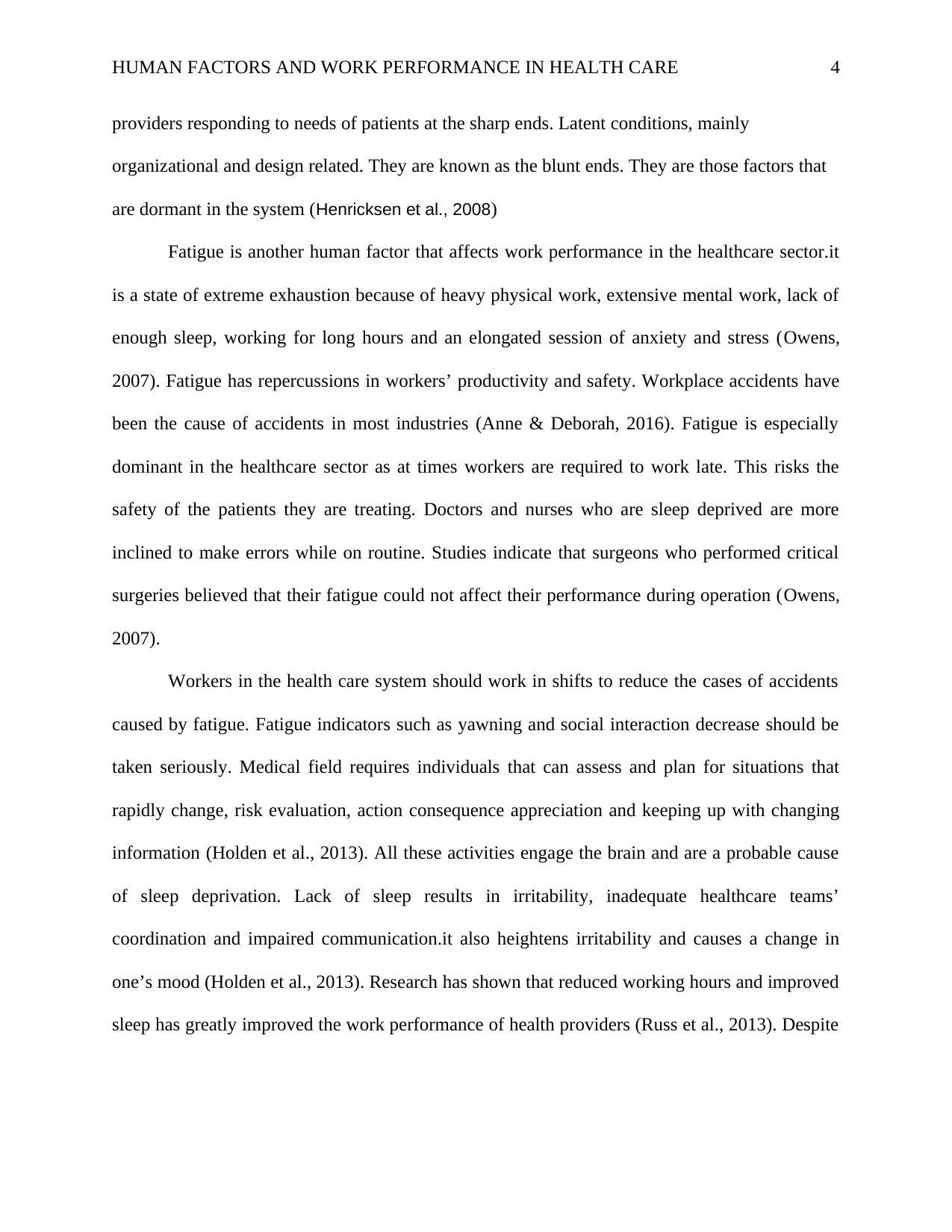
HUMAN FACTORS AND WORK PERFORMANCE IN HEALTH CARE 4
providers responding to needs of patients at the sharp ends. Latent conditions, mainly
organizational and design related. They are known as the blunt ends. They are those factors that
are dormant in the system (Henricksen et al., 2008)
Fatigue is another human factor that affects work performance in the healthcare sector.it
is a state of extreme exhaustion because of heavy physical work, extensive mental work, lack of
enough sleep, working for long hours and an elongated session of anxiety and stress (Owens,
2007). Fatigue has repercussions in workers’ productivity and safety. Workplace accidents have
been the cause of accidents in most industries (Anne & Deborah, 2016). Fatigue is especially
dominant in the healthcare sector as at times workers are required to work late. This risks the
safety of the patients they are treating. Doctors and nurses who are sleep deprived are more
inclined to make errors while on routine. Studies indicate that surgeons who performed critical
surgeries believed that their fatigue could not affect their performance during operation (Owens,
2007).
Workers in the health care system should work in shifts to reduce the cases of accidents
caused by fatigue. Fatigue indicators such as yawning and social interaction decrease should be
taken seriously. Medical field requires individuals that can assess and plan for situations that
rapidly change, risk evaluation, action consequence appreciation and keeping up with changing
information (Holden et al., 2013). All these activities engage the brain and are a probable cause
of sleep deprivation. Lack of sleep results in irritability, inadequate healthcare teams’
coordination and impaired communication.it also heightens irritability and causes a change in
one’s mood (Holden et al., 2013). Research has shown that reduced working hours and improved
sleep has greatly improved the work performance of health providers (Russ et al., 2013). Despite
providers responding to needs of patients at the sharp ends. Latent conditions, mainly
organizational and design related. They are known as the blunt ends. They are those factors that
are dormant in the system (Henricksen et al., 2008)
Fatigue is another human factor that affects work performance in the healthcare sector.it
is a state of extreme exhaustion because of heavy physical work, extensive mental work, lack of
enough sleep, working for long hours and an elongated session of anxiety and stress (Owens,
2007). Fatigue has repercussions in workers’ productivity and safety. Workplace accidents have
been the cause of accidents in most industries (Anne & Deborah, 2016). Fatigue is especially
dominant in the healthcare sector as at times workers are required to work late. This risks the
safety of the patients they are treating. Doctors and nurses who are sleep deprived are more
inclined to make errors while on routine. Studies indicate that surgeons who performed critical
surgeries believed that their fatigue could not affect their performance during operation (Owens,
2007).
Workers in the health care system should work in shifts to reduce the cases of accidents
caused by fatigue. Fatigue indicators such as yawning and social interaction decrease should be
taken seriously. Medical field requires individuals that can assess and plan for situations that
rapidly change, risk evaluation, action consequence appreciation and keeping up with changing
information (Holden et al., 2013). All these activities engage the brain and are a probable cause
of sleep deprivation. Lack of sleep results in irritability, inadequate healthcare teams’
coordination and impaired communication.it also heightens irritability and causes a change in
one’s mood (Holden et al., 2013). Research has shown that reduced working hours and improved
sleep has greatly improved the work performance of health providers (Russ et al., 2013). Despite
Secure Best Marks with AI Grader
Need help grading? Try our AI Grader for instant feedback on your assignments.
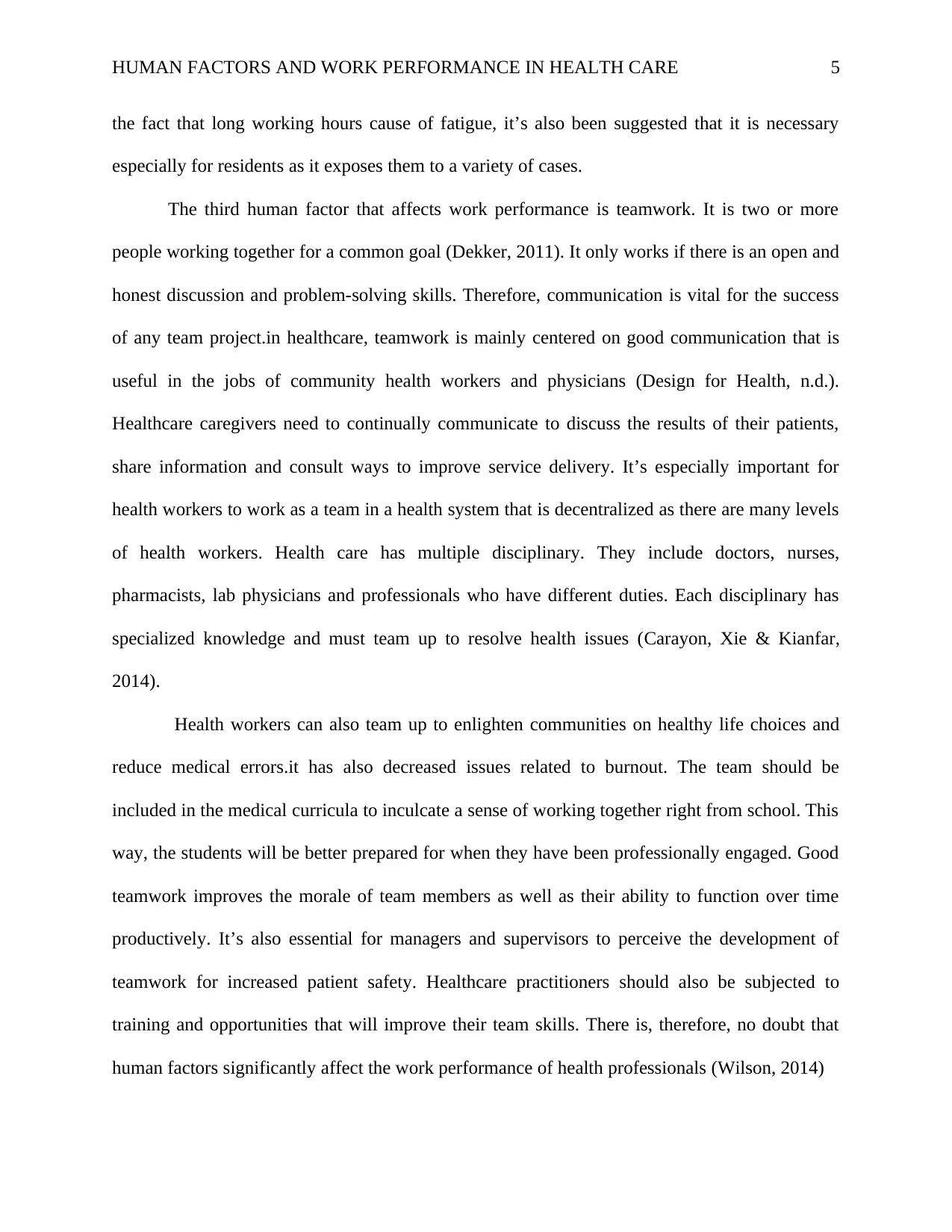
HUMAN FACTORS AND WORK PERFORMANCE IN HEALTH CARE 5
the fact that long working hours cause of fatigue, it’s also been suggested that it is necessary
especially for residents as it exposes them to a variety of cases.
The third human factor that affects work performance is teamwork. It is two or more
people working together for a common goal (Dekker, 2011). It only works if there is an open and
honest discussion and problem-solving skills. Therefore, communication is vital for the success
of any team project.in healthcare, teamwork is mainly centered on good communication that is
useful in the jobs of community health workers and physicians (Design for Health, n.d.).
Healthcare caregivers need to continually communicate to discuss the results of their patients,
share information and consult ways to improve service delivery. It’s especially important for
health workers to work as a team in a health system that is decentralized as there are many levels
of health workers. Health care has multiple disciplinary. They include doctors, nurses,
pharmacists, lab physicians and professionals who have different duties. Each disciplinary has
specialized knowledge and must team up to resolve health issues (Carayon, Xie & Kianfar,
2014).
Health workers can also team up to enlighten communities on healthy life choices and
reduce medical errors.it has also decreased issues related to burnout. The team should be
included in the medical curricula to inculcate a sense of working together right from school. This
way, the students will be better prepared for when they have been professionally engaged. Good
teamwork improves the morale of team members as well as their ability to function over time
productively. It’s also essential for managers and supervisors to perceive the development of
teamwork for increased patient safety. Healthcare practitioners should also be subjected to
training and opportunities that will improve their team skills. There is, therefore, no doubt that
human factors significantly affect the work performance of health professionals (Wilson, 2014)
the fact that long working hours cause of fatigue, it’s also been suggested that it is necessary
especially for residents as it exposes them to a variety of cases.
The third human factor that affects work performance is teamwork. It is two or more
people working together for a common goal (Dekker, 2011). It only works if there is an open and
honest discussion and problem-solving skills. Therefore, communication is vital for the success
of any team project.in healthcare, teamwork is mainly centered on good communication that is
useful in the jobs of community health workers and physicians (Design for Health, n.d.).
Healthcare caregivers need to continually communicate to discuss the results of their patients,
share information and consult ways to improve service delivery. It’s especially important for
health workers to work as a team in a health system that is decentralized as there are many levels
of health workers. Health care has multiple disciplinary. They include doctors, nurses,
pharmacists, lab physicians and professionals who have different duties. Each disciplinary has
specialized knowledge and must team up to resolve health issues (Carayon, Xie & Kianfar,
2014).
Health workers can also team up to enlighten communities on healthy life choices and
reduce medical errors.it has also decreased issues related to burnout. The team should be
included in the medical curricula to inculcate a sense of working together right from school. This
way, the students will be better prepared for when they have been professionally engaged. Good
teamwork improves the morale of team members as well as their ability to function over time
productively. It’s also essential for managers and supervisors to perceive the development of
teamwork for increased patient safety. Healthcare practitioners should also be subjected to
training and opportunities that will improve their team skills. There is, therefore, no doubt that
human factors significantly affect the work performance of health professionals (Wilson, 2014)
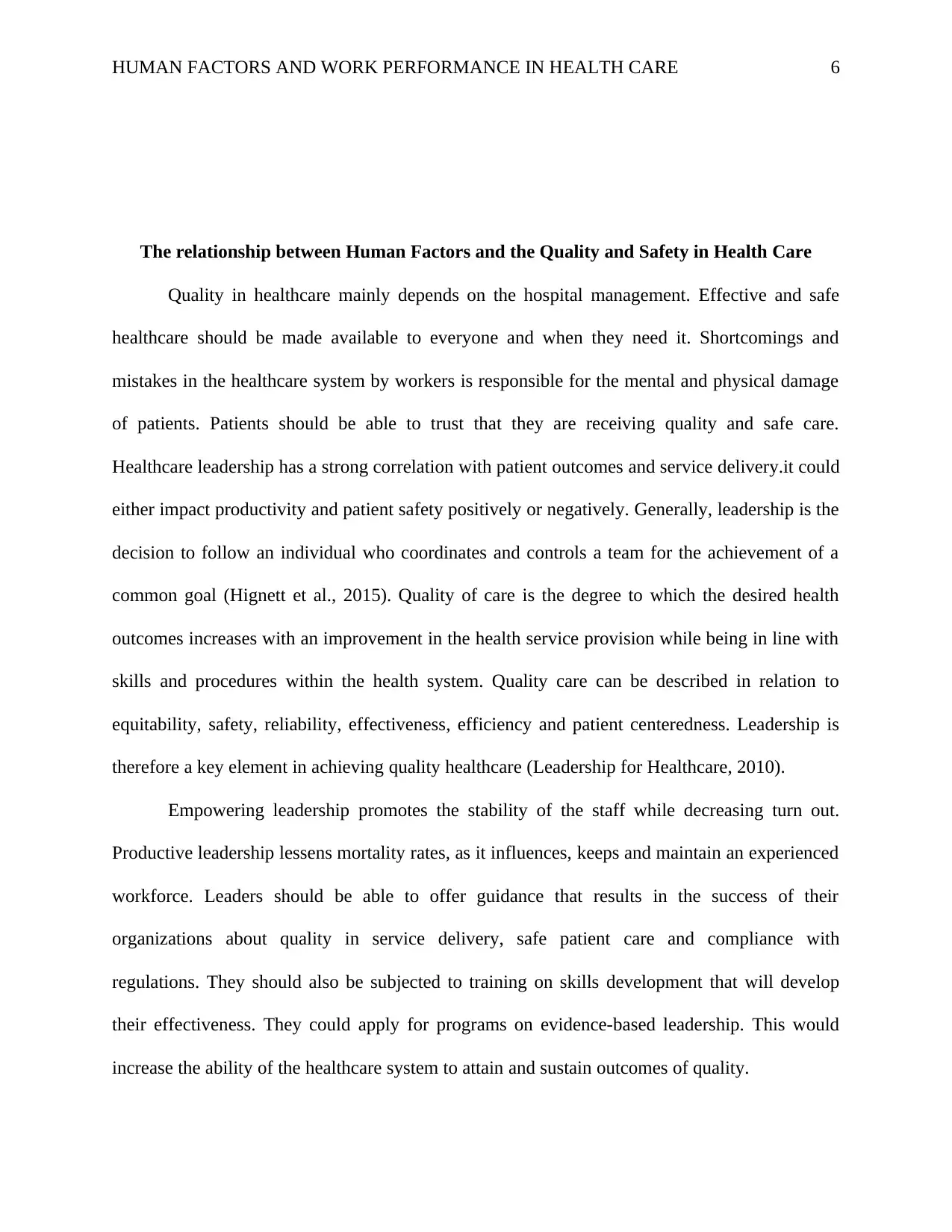
HUMAN FACTORS AND WORK PERFORMANCE IN HEALTH CARE 6
The relationship between Human Factors and the Quality and Safety in Health Care
Quality in healthcare mainly depends on the hospital management. Effective and safe
healthcare should be made available to everyone and when they need it. Shortcomings and
mistakes in the healthcare system by workers is responsible for the mental and physical damage
of patients. Patients should be able to trust that they are receiving quality and safe care.
Healthcare leadership has a strong correlation with patient outcomes and service delivery.it could
either impact productivity and patient safety positively or negatively. Generally, leadership is the
decision to follow an individual who coordinates and controls a team for the achievement of a
common goal (Hignett et al., 2015). Quality of care is the degree to which the desired health
outcomes increases with an improvement in the health service provision while being in line with
skills and procedures within the health system. Quality care can be described in relation to
equitability, safety, reliability, effectiveness, efficiency and patient centeredness. Leadership is
therefore a key element in achieving quality healthcare (Leadership for Healthcare, 2010).
Empowering leadership promotes the stability of the staff while decreasing turn out.
Productive leadership lessens mortality rates, as it influences, keeps and maintain an experienced
workforce. Leaders should be able to offer guidance that results in the success of their
organizations about quality in service delivery, safe patient care and compliance with
regulations. They should also be subjected to training on skills development that will develop
their effectiveness. They could apply for programs on evidence-based leadership. This would
increase the ability of the healthcare system to attain and sustain outcomes of quality.
The relationship between Human Factors and the Quality and Safety in Health Care
Quality in healthcare mainly depends on the hospital management. Effective and safe
healthcare should be made available to everyone and when they need it. Shortcomings and
mistakes in the healthcare system by workers is responsible for the mental and physical damage
of patients. Patients should be able to trust that they are receiving quality and safe care.
Healthcare leadership has a strong correlation with patient outcomes and service delivery.it could
either impact productivity and patient safety positively or negatively. Generally, leadership is the
decision to follow an individual who coordinates and controls a team for the achievement of a
common goal (Hignett et al., 2015). Quality of care is the degree to which the desired health
outcomes increases with an improvement in the health service provision while being in line with
skills and procedures within the health system. Quality care can be described in relation to
equitability, safety, reliability, effectiveness, efficiency and patient centeredness. Leadership is
therefore a key element in achieving quality healthcare (Leadership for Healthcare, 2010).
Empowering leadership promotes the stability of the staff while decreasing turn out.
Productive leadership lessens mortality rates, as it influences, keeps and maintain an experienced
workforce. Leaders should be able to offer guidance that results in the success of their
organizations about quality in service delivery, safe patient care and compliance with
regulations. They should also be subjected to training on skills development that will develop
their effectiveness. They could apply for programs on evidence-based leadership. This would
increase the ability of the healthcare system to attain and sustain outcomes of quality.
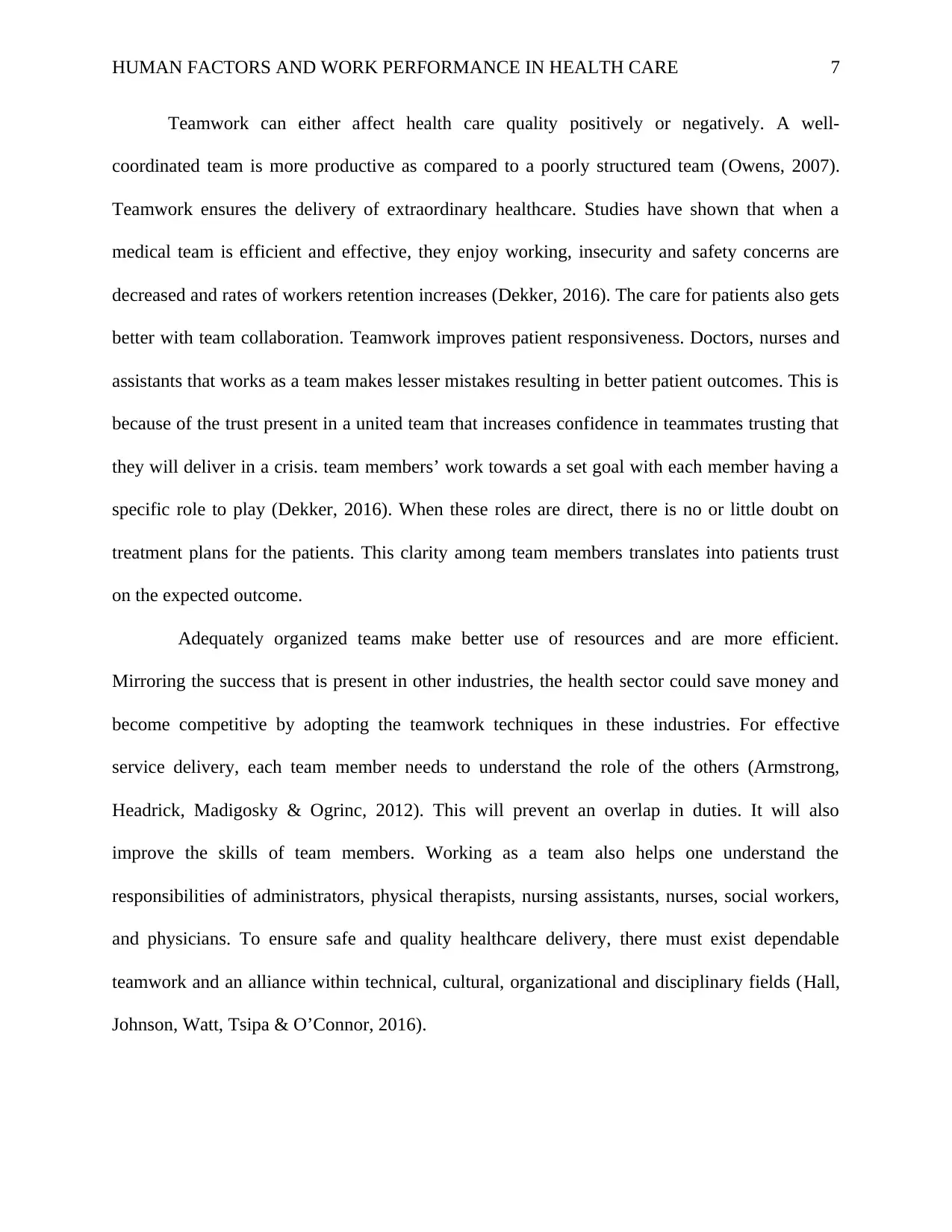
HUMAN FACTORS AND WORK PERFORMANCE IN HEALTH CARE 7
Teamwork can either affect health care quality positively or negatively. A well-
coordinated team is more productive as compared to a poorly structured team (Owens, 2007).
Teamwork ensures the delivery of extraordinary healthcare. Studies have shown that when a
medical team is efficient and effective, they enjoy working, insecurity and safety concerns are
decreased and rates of workers retention increases (Dekker, 2016). The care for patients also gets
better with team collaboration. Teamwork improves patient responsiveness. Doctors, nurses and
assistants that works as a team makes lesser mistakes resulting in better patient outcomes. This is
because of the trust present in a united team that increases confidence in teammates trusting that
they will deliver in a crisis. team members’ work towards a set goal with each member having a
specific role to play (Dekker, 2016). When these roles are direct, there is no or little doubt on
treatment plans for the patients. This clarity among team members translates into patients trust
on the expected outcome.
Adequately organized teams make better use of resources and are more efficient.
Mirroring the success that is present in other industries, the health sector could save money and
become competitive by adopting the teamwork techniques in these industries. For effective
service delivery, each team member needs to understand the role of the others (Armstrong,
Headrick, Madigosky & Ogrinc, 2012). This will prevent an overlap in duties. It will also
improve the skills of team members. Working as a team also helps one understand the
responsibilities of administrators, physical therapists, nursing assistants, nurses, social workers,
and physicians. To ensure safe and quality healthcare delivery, there must exist dependable
teamwork and an alliance within technical, cultural, organizational and disciplinary fields (Hall,
Johnson, Watt, Tsipa & O’Connor, 2016).
Teamwork can either affect health care quality positively or negatively. A well-
coordinated team is more productive as compared to a poorly structured team (Owens, 2007).
Teamwork ensures the delivery of extraordinary healthcare. Studies have shown that when a
medical team is efficient and effective, they enjoy working, insecurity and safety concerns are
decreased and rates of workers retention increases (Dekker, 2016). The care for patients also gets
better with team collaboration. Teamwork improves patient responsiveness. Doctors, nurses and
assistants that works as a team makes lesser mistakes resulting in better patient outcomes. This is
because of the trust present in a united team that increases confidence in teammates trusting that
they will deliver in a crisis. team members’ work towards a set goal with each member having a
specific role to play (Dekker, 2016). When these roles are direct, there is no or little doubt on
treatment plans for the patients. This clarity among team members translates into patients trust
on the expected outcome.
Adequately organized teams make better use of resources and are more efficient.
Mirroring the success that is present in other industries, the health sector could save money and
become competitive by adopting the teamwork techniques in these industries. For effective
service delivery, each team member needs to understand the role of the others (Armstrong,
Headrick, Madigosky & Ogrinc, 2012). This will prevent an overlap in duties. It will also
improve the skills of team members. Working as a team also helps one understand the
responsibilities of administrators, physical therapists, nursing assistants, nurses, social workers,
and physicians. To ensure safe and quality healthcare delivery, there must exist dependable
teamwork and an alliance within technical, cultural, organizational and disciplinary fields (Hall,
Johnson, Watt, Tsipa & O’Connor, 2016).
Paraphrase This Document
Need a fresh take? Get an instant paraphrase of this document with our AI Paraphraser
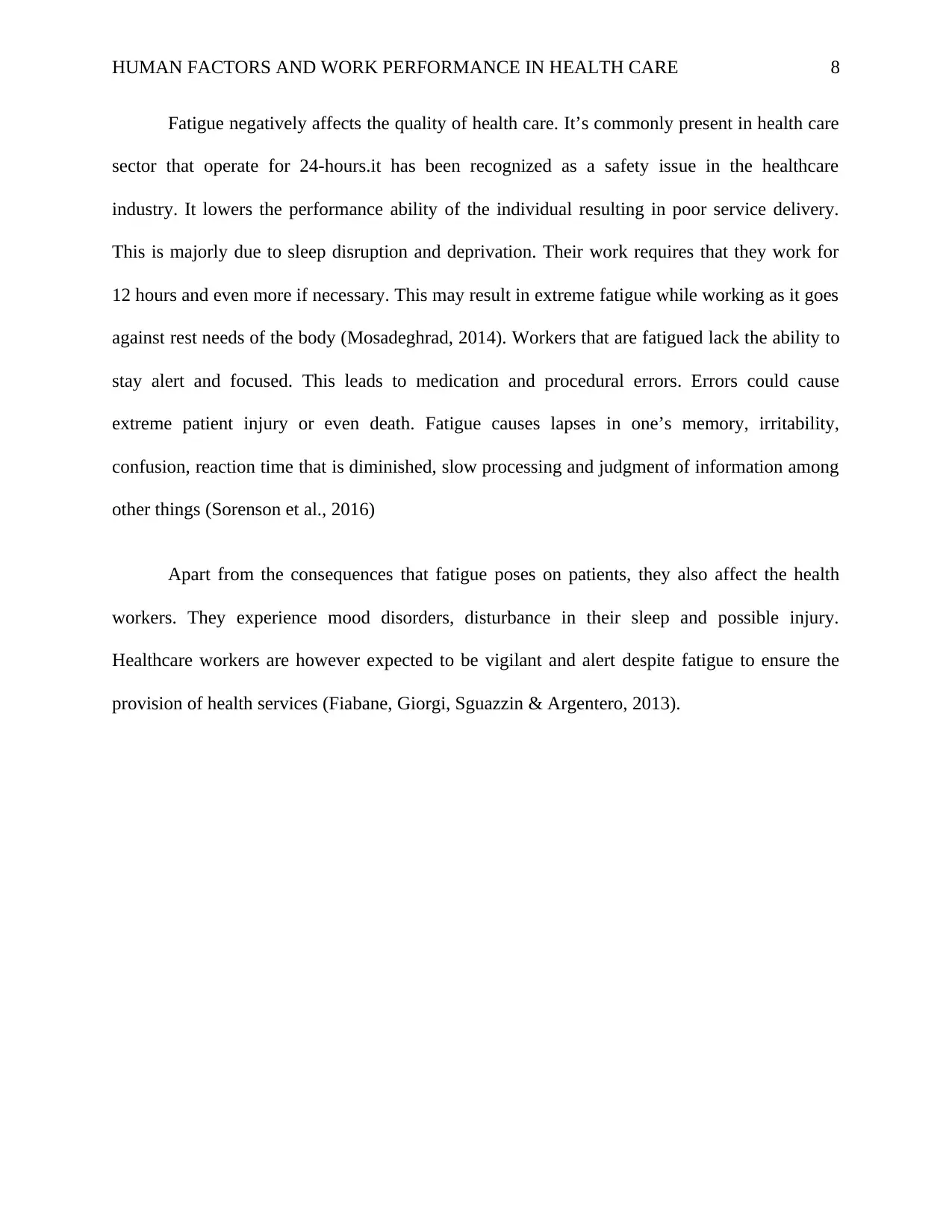
HUMAN FACTORS AND WORK PERFORMANCE IN HEALTH CARE 8
Fatigue negatively affects the quality of health care. It’s commonly present in health care
sector that operate for 24-hours.it has been recognized as a safety issue in the healthcare
industry. It lowers the performance ability of the individual resulting in poor service delivery.
This is majorly due to sleep disruption and deprivation. Their work requires that they work for
12 hours and even more if necessary. This may result in extreme fatigue while working as it goes
against rest needs of the body (Mosadeghrad, 2014). Workers that are fatigued lack the ability to
stay alert and focused. This leads to medication and procedural errors. Errors could cause
extreme patient injury or even death. Fatigue causes lapses in one’s memory, irritability,
confusion, reaction time that is diminished, slow processing and judgment of information among
other things (Sorenson et al., 2016)
Apart from the consequences that fatigue poses on patients, they also affect the health
workers. They experience mood disorders, disturbance in their sleep and possible injury.
Healthcare workers are however expected to be vigilant and alert despite fatigue to ensure the
provision of health services (Fiabane, Giorgi, Sguazzin & Argentero, 2013).
Fatigue negatively affects the quality of health care. It’s commonly present in health care
sector that operate for 24-hours.it has been recognized as a safety issue in the healthcare
industry. It lowers the performance ability of the individual resulting in poor service delivery.
This is majorly due to sleep disruption and deprivation. Their work requires that they work for
12 hours and even more if necessary. This may result in extreme fatigue while working as it goes
against rest needs of the body (Mosadeghrad, 2014). Workers that are fatigued lack the ability to
stay alert and focused. This leads to medication and procedural errors. Errors could cause
extreme patient injury or even death. Fatigue causes lapses in one’s memory, irritability,
confusion, reaction time that is diminished, slow processing and judgment of information among
other things (Sorenson et al., 2016)
Apart from the consequences that fatigue poses on patients, they also affect the health
workers. They experience mood disorders, disturbance in their sleep and possible injury.
Healthcare workers are however expected to be vigilant and alert despite fatigue to ensure the
provision of health services (Fiabane, Giorgi, Sguazzin & Argentero, 2013).
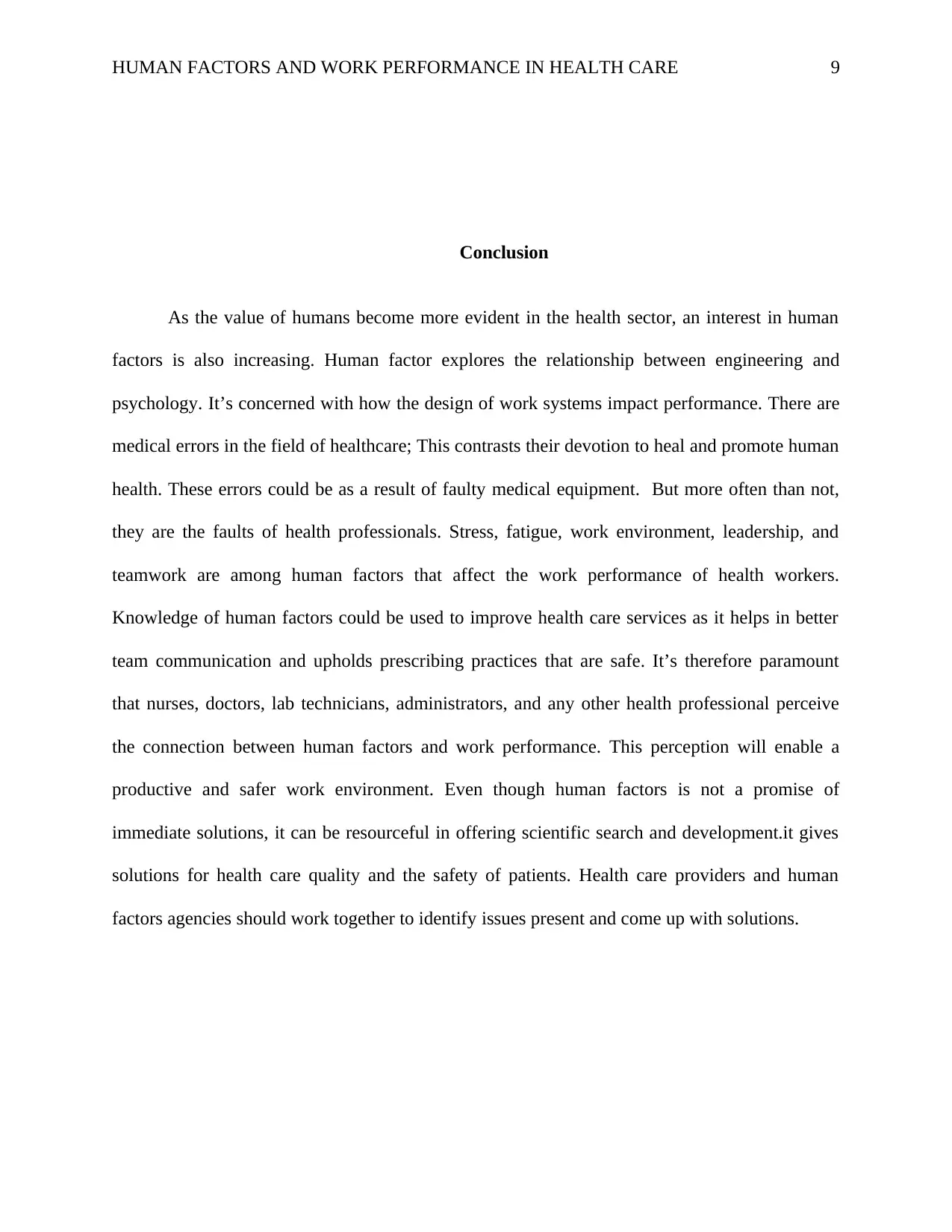
HUMAN FACTORS AND WORK PERFORMANCE IN HEALTH CARE 9
Conclusion
As the value of humans become more evident in the health sector, an interest in human
factors is also increasing. Human factor explores the relationship between engineering and
psychology. It’s concerned with how the design of work systems impact performance. There are
medical errors in the field of healthcare; This contrasts their devotion to heal and promote human
health. These errors could be as a result of faulty medical equipment. But more often than not,
they are the faults of health professionals. Stress, fatigue, work environment, leadership, and
teamwork are among human factors that affect the work performance of health workers.
Knowledge of human factors could be used to improve health care services as it helps in better
team communication and upholds prescribing practices that are safe. It’s therefore paramount
that nurses, doctors, lab technicians, administrators, and any other health professional perceive
the connection between human factors and work performance. This perception will enable a
productive and safer work environment. Even though human factors is not a promise of
immediate solutions, it can be resourceful in offering scientific search and development.it gives
solutions for health care quality and the safety of patients. Health care providers and human
factors agencies should work together to identify issues present and come up with solutions.
Conclusion
As the value of humans become more evident in the health sector, an interest in human
factors is also increasing. Human factor explores the relationship between engineering and
psychology. It’s concerned with how the design of work systems impact performance. There are
medical errors in the field of healthcare; This contrasts their devotion to heal and promote human
health. These errors could be as a result of faulty medical equipment. But more often than not,
they are the faults of health professionals. Stress, fatigue, work environment, leadership, and
teamwork are among human factors that affect the work performance of health workers.
Knowledge of human factors could be used to improve health care services as it helps in better
team communication and upholds prescribing practices that are safe. It’s therefore paramount
that nurses, doctors, lab technicians, administrators, and any other health professional perceive
the connection between human factors and work performance. This perception will enable a
productive and safer work environment. Even though human factors is not a promise of
immediate solutions, it can be resourceful in offering scientific search and development.it gives
solutions for health care quality and the safety of patients. Health care providers and human
factors agencies should work together to identify issues present and come up with solutions.
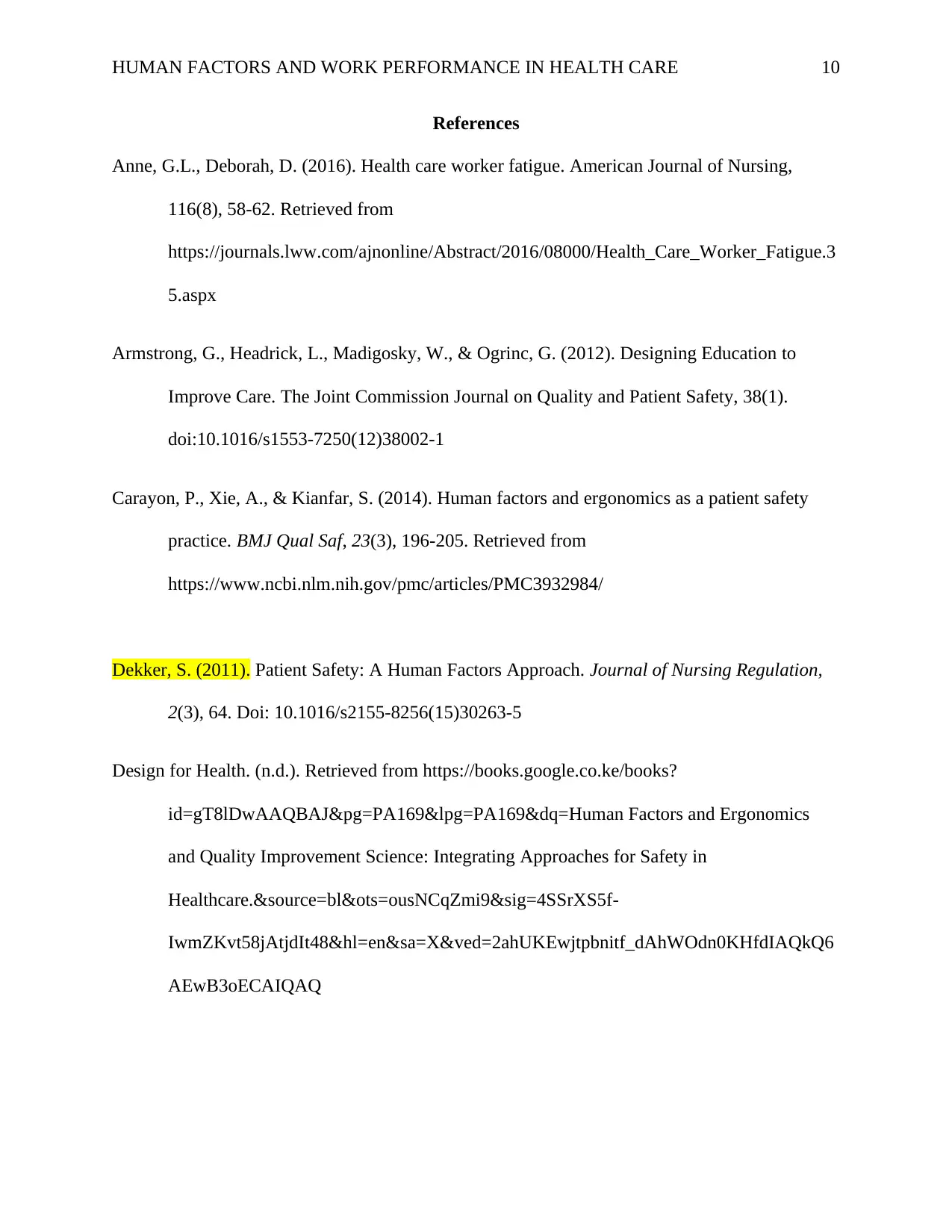
HUMAN FACTORS AND WORK PERFORMANCE IN HEALTH CARE 10
References
Anne, G.L., Deborah, D. (2016). Health care worker fatigue. American Journal of Nursing,
116(8), 58-62. Retrieved from
https://journals.lww.com/ajnonline/Abstract/2016/08000/Health_Care_Worker_Fatigue.3
5.aspx
Armstrong, G., Headrick, L., Madigosky, W., & Ogrinc, G. (2012). Designing Education to
Improve Care. The Joint Commission Journal on Quality and Patient Safety, 38(1).
doi:10.1016/s1553-7250(12)38002-1
Carayon, P., Xie, A., & Kianfar, S. (2014). Human factors and ergonomics as a patient safety
practice. BMJ Qual Saf, 23(3), 196-205. Retrieved from
https://www.ncbi.nlm.nih.gov/pmc/articles/PMC3932984/
Dekker, S. (2011). Patient Safety: A Human Factors Approach. Journal of Nursing Regulation,
2(3), 64. Doi: 10.1016/s2155-8256(15)30263-5
Design for Health. (n.d.). Retrieved from https://books.google.co.ke/books?
id=gT8lDwAAQBAJ&pg=PA169&lpg=PA169&dq=Human Factors and Ergonomics
and Quality Improvement Science: Integrating Approaches for Safety in
Healthcare.&source=bl&ots=ousNCqZmi9&sig=4SSrXS5f-
IwmZKvt58jAtjdIt48&hl=en&sa=X&ved=2ahUKEwjtpbnitf_dAhWOdn0KHfdIAQkQ6
AEwB3oECAIQAQ
References
Anne, G.L., Deborah, D. (2016). Health care worker fatigue. American Journal of Nursing,
116(8), 58-62. Retrieved from
https://journals.lww.com/ajnonline/Abstract/2016/08000/Health_Care_Worker_Fatigue.3
5.aspx
Armstrong, G., Headrick, L., Madigosky, W., & Ogrinc, G. (2012). Designing Education to
Improve Care. The Joint Commission Journal on Quality and Patient Safety, 38(1).
doi:10.1016/s1553-7250(12)38002-1
Carayon, P., Xie, A., & Kianfar, S. (2014). Human factors and ergonomics as a patient safety
practice. BMJ Qual Saf, 23(3), 196-205. Retrieved from
https://www.ncbi.nlm.nih.gov/pmc/articles/PMC3932984/
Dekker, S. (2011). Patient Safety: A Human Factors Approach. Journal of Nursing Regulation,
2(3), 64. Doi: 10.1016/s2155-8256(15)30263-5
Design for Health. (n.d.). Retrieved from https://books.google.co.ke/books?
id=gT8lDwAAQBAJ&pg=PA169&lpg=PA169&dq=Human Factors and Ergonomics
and Quality Improvement Science: Integrating Approaches for Safety in
Healthcare.&source=bl&ots=ousNCqZmi9&sig=4SSrXS5f-
IwmZKvt58jAtjdIt48&hl=en&sa=X&ved=2ahUKEwjtpbnitf_dAhWOdn0KHfdIAQkQ6
AEwB3oECAIQAQ
Secure Best Marks with AI Grader
Need help grading? Try our AI Grader for instant feedback on your assignments.
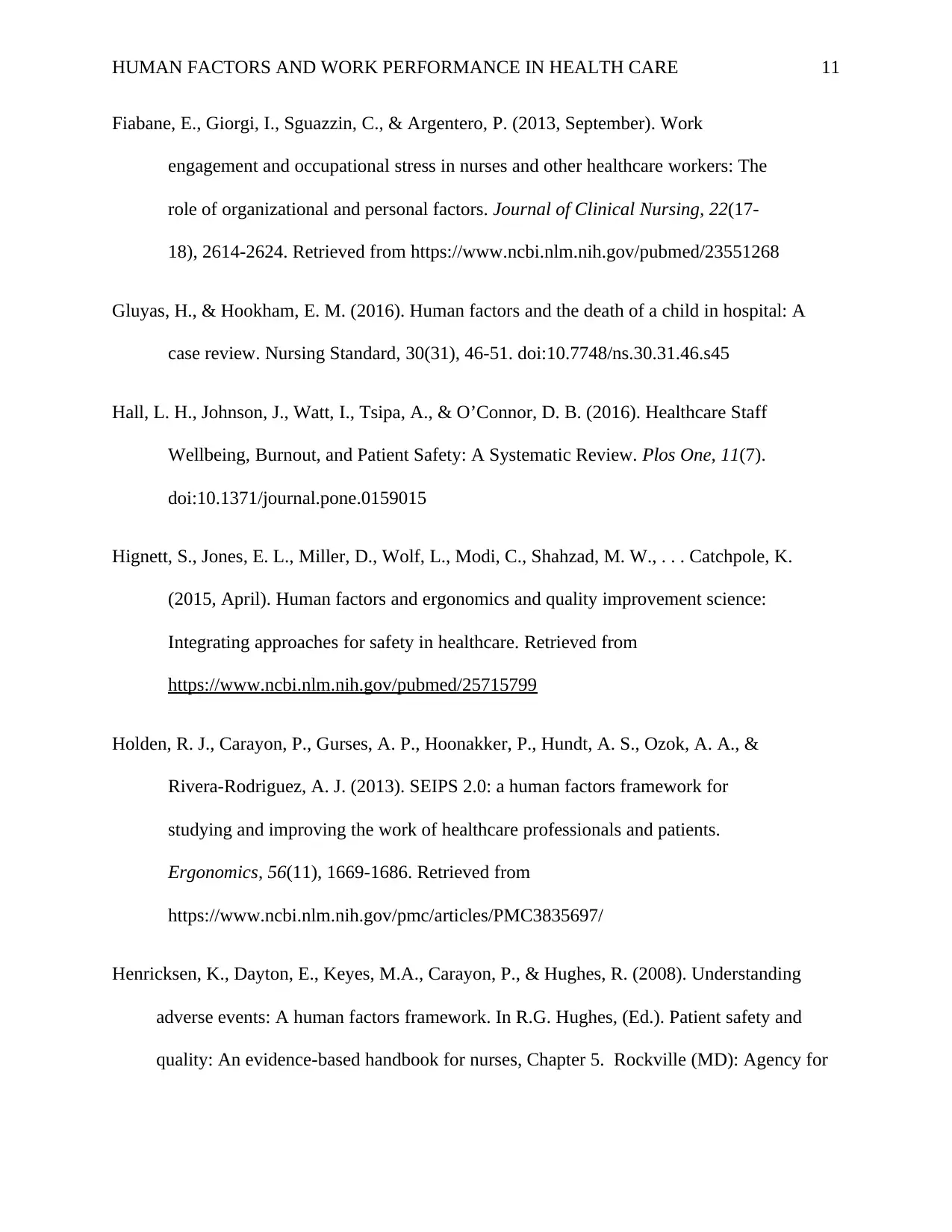
HUMAN FACTORS AND WORK PERFORMANCE IN HEALTH CARE 11
Fiabane, E., Giorgi, I., Sguazzin, C., & Argentero, P. (2013, September). Work
engagement and occupational stress in nurses and other healthcare workers: The
role of organizational and personal factors. Journal of Clinical Nursing, 22(17-
18), 2614-2624. Retrieved from https://www.ncbi.nlm.nih.gov/pubmed/23551268
Gluyas, H., & Hookham, E. M. (2016). Human factors and the death of a child in hospital: A
case review. Nursing Standard, 30(31), 46-51. doi:10.7748/ns.30.31.46.s45
Hall, L. H., Johnson, J., Watt, I., Tsipa, A., & O’Connor, D. B. (2016). Healthcare Staff
Wellbeing, Burnout, and Patient Safety: A Systematic Review. Plos One, 11(7).
doi:10.1371/journal.pone.0159015
Hignett, S., Jones, E. L., Miller, D., Wolf, L., Modi, C., Shahzad, M. W., . . . Catchpole, K.
(2015, April). Human factors and ergonomics and quality improvement science:
Integrating approaches for safety in healthcare. Retrieved from
https://www.ncbi.nlm.nih.gov/pubmed/25715799
Holden, R. J., Carayon, P., Gurses, A. P., Hoonakker, P., Hundt, A. S., Ozok, A. A., &
Rivera-Rodriguez, A. J. (2013). SEIPS 2.0: a human factors framework for
studying and improving the work of healthcare professionals and patients.
Ergonomics, 56(11), 1669-1686. Retrieved from
https://www.ncbi.nlm.nih.gov/pmc/articles/PMC3835697/
Henricksen, K., Dayton, E., Keyes, M.A., Carayon, P., & Hughes, R. (2008). Understanding
adverse events: A human factors framework. In R.G. Hughes, (Ed.). Patient safety and
quality: An evidence-based handbook for nurses, Chapter 5. Rockville (MD): Agency for
Fiabane, E., Giorgi, I., Sguazzin, C., & Argentero, P. (2013, September). Work
engagement and occupational stress in nurses and other healthcare workers: The
role of organizational and personal factors. Journal of Clinical Nursing, 22(17-
18), 2614-2624. Retrieved from https://www.ncbi.nlm.nih.gov/pubmed/23551268
Gluyas, H., & Hookham, E. M. (2016). Human factors and the death of a child in hospital: A
case review. Nursing Standard, 30(31), 46-51. doi:10.7748/ns.30.31.46.s45
Hall, L. H., Johnson, J., Watt, I., Tsipa, A., & O’Connor, D. B. (2016). Healthcare Staff
Wellbeing, Burnout, and Patient Safety: A Systematic Review. Plos One, 11(7).
doi:10.1371/journal.pone.0159015
Hignett, S., Jones, E. L., Miller, D., Wolf, L., Modi, C., Shahzad, M. W., . . . Catchpole, K.
(2015, April). Human factors and ergonomics and quality improvement science:
Integrating approaches for safety in healthcare. Retrieved from
https://www.ncbi.nlm.nih.gov/pubmed/25715799
Holden, R. J., Carayon, P., Gurses, A. P., Hoonakker, P., Hundt, A. S., Ozok, A. A., &
Rivera-Rodriguez, A. J. (2013). SEIPS 2.0: a human factors framework for
studying and improving the work of healthcare professionals and patients.
Ergonomics, 56(11), 1669-1686. Retrieved from
https://www.ncbi.nlm.nih.gov/pmc/articles/PMC3835697/
Henricksen, K., Dayton, E., Keyes, M.A., Carayon, P., & Hughes, R. (2008). Understanding
adverse events: A human factors framework. In R.G. Hughes, (Ed.). Patient safety and
quality: An evidence-based handbook for nurses, Chapter 5. Rockville (MD): Agency for
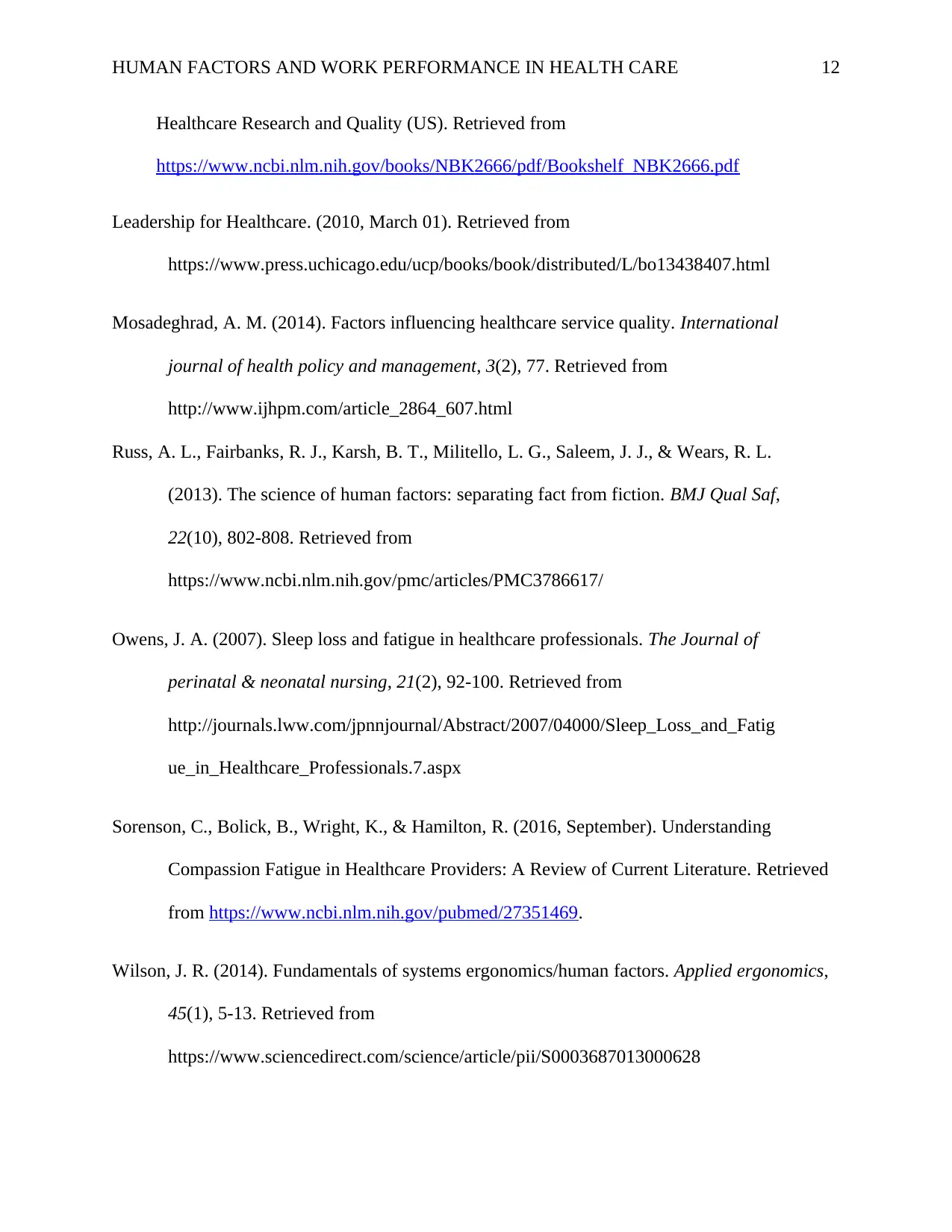
HUMAN FACTORS AND WORK PERFORMANCE IN HEALTH CARE 12
Healthcare Research and Quality (US). Retrieved from
https://www.ncbi.nlm.nih.gov/books/NBK2666/pdf/Bookshelf_NBK2666.pdf
Leadership for Healthcare. (2010, March 01). Retrieved from
https://www.press.uchicago.edu/ucp/books/book/distributed/L/bo13438407.html
Mosadeghrad, A. M. (2014). Factors influencing healthcare service quality. International
journal of health policy and management, 3(2), 77. Retrieved from
http://www.ijhpm.com/article_2864_607.html
Russ, A. L., Fairbanks, R. J., Karsh, B. T., Militello, L. G., Saleem, J. J., & Wears, R. L.
(2013). The science of human factors: separating fact from fiction. BMJ Qual Saf,
22(10), 802-808. Retrieved from
https://www.ncbi.nlm.nih.gov/pmc/articles/PMC3786617/
Owens, J. A. (2007). Sleep loss and fatigue in healthcare professionals. The Journal of
perinatal & neonatal nursing, 21(2), 92-100. Retrieved from
http://journals.lww.com/jpnnjournal/Abstract/2007/04000/Sleep_Loss_and_Fatig
ue_in_Healthcare_Professionals.7.aspx
Sorenson, C., Bolick, B., Wright, K., & Hamilton, R. (2016, September). Understanding
Compassion Fatigue in Healthcare Providers: A Review of Current Literature. Retrieved
from https://www.ncbi.nlm.nih.gov/pubmed/27351469.
Wilson, J. R. (2014). Fundamentals of systems ergonomics/human factors. Applied ergonomics,
45(1), 5-13. Retrieved from
https://www.sciencedirect.com/science/article/pii/S0003687013000628
Healthcare Research and Quality (US). Retrieved from
https://www.ncbi.nlm.nih.gov/books/NBK2666/pdf/Bookshelf_NBK2666.pdf
Leadership for Healthcare. (2010, March 01). Retrieved from
https://www.press.uchicago.edu/ucp/books/book/distributed/L/bo13438407.html
Mosadeghrad, A. M. (2014). Factors influencing healthcare service quality. International
journal of health policy and management, 3(2), 77. Retrieved from
http://www.ijhpm.com/article_2864_607.html
Russ, A. L., Fairbanks, R. J., Karsh, B. T., Militello, L. G., Saleem, J. J., & Wears, R. L.
(2013). The science of human factors: separating fact from fiction. BMJ Qual Saf,
22(10), 802-808. Retrieved from
https://www.ncbi.nlm.nih.gov/pmc/articles/PMC3786617/
Owens, J. A. (2007). Sleep loss and fatigue in healthcare professionals. The Journal of
perinatal & neonatal nursing, 21(2), 92-100. Retrieved from
http://journals.lww.com/jpnnjournal/Abstract/2007/04000/Sleep_Loss_and_Fatig
ue_in_Healthcare_Professionals.7.aspx
Sorenson, C., Bolick, B., Wright, K., & Hamilton, R. (2016, September). Understanding
Compassion Fatigue in Healthcare Providers: A Review of Current Literature. Retrieved
from https://www.ncbi.nlm.nih.gov/pubmed/27351469.
Wilson, J. R. (2014). Fundamentals of systems ergonomics/human factors. Applied ergonomics,
45(1), 5-13. Retrieved from
https://www.sciencedirect.com/science/article/pii/S0003687013000628

HUMAN FACTORS AND WORK PERFORMANCE IN HEALTH CARE 13
1 out of 13
Related Documents
Your All-in-One AI-Powered Toolkit for Academic Success.
+13062052269
info@desklib.com
Available 24*7 on WhatsApp / Email
![[object Object]](/_next/static/media/star-bottom.7253800d.svg)
Unlock your academic potential
© 2024 | Zucol Services PVT LTD | All rights reserved.





